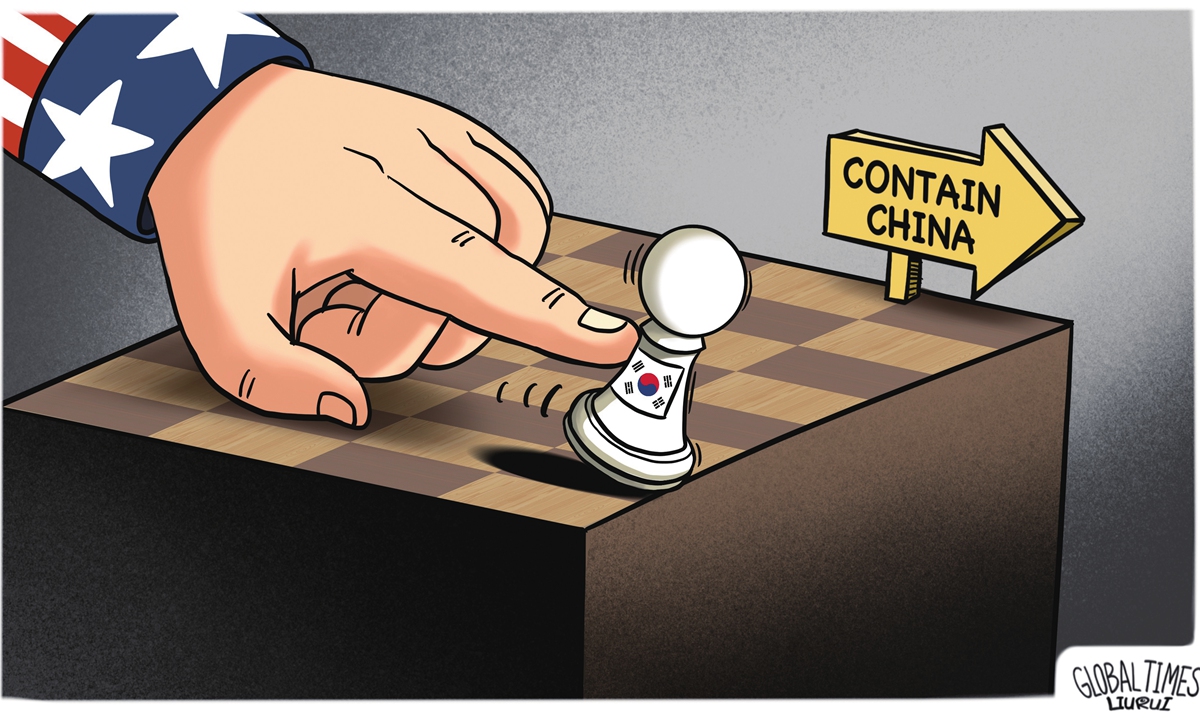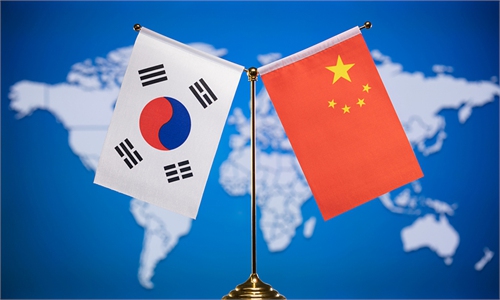South Korea's diplomacy drifting further away from being 'confident': Global Times editorial

Illustration: Liu Rui/GT
An official from the South Korean Presidential Office said on Monday during a media briefing that an inappropriate bridging role by an ambassador could harm the national interests of both the home and host countries referring to Chinese Ambassador Xing Haiming's recent remarks on South Korean government's foreign policies and insinuated that Ambassador Xing had violated the Vienna Convention on Diplomatic Relations. This marks a new escalation in the attacks by the South Korean government and conservative media against Ambassador Xing. The Yonhap News Agency said that it is extremely rare for the South Korean Presidential Office to directly criticize an ambassador of a specific country, indicating that the situation is being taken very seriously by the office.
In the past few days, the South Korean Ministry of Foreign Affairs and conservative media have unleashed an "unignorable anger" against Ambassador Xing, resorting to various disrespectful and uncivilized language that is unbecoming of their positions. South Korea's diplomacy is once again displaying the behavior of an emotionally unstable person, going from inexplicable fury to reckless speeches and erratic actions. The South Korean foreign ministry summoned Ambassador Xing to lodge a complaint, and politicians clamored, accusing Xing of "clear interference in domestic affairs and a serious diplomatic discourtesy." There are even lawmakers on social media inciting the government to actively consider designating Xing as "persona non grata." One can easily imagine the excited and distorted face of the conservative media in South Korea at this time.
What "excessive" things on earth did Ambassador Xing do and what "over-the-top" statements did he make that turned South Korea's diplomacy into a hornet's nest? It is truly unbelievable. On June 8, Ambassador Xing met the leader of the Democratic Party of Korea Lee Jae-myung at the embassy to discuss China-South Korea relations and the Korean Peninsula issue. It is a normal part of any ambassador's work to engage with various sectors of the host country. How could this be considered "excessive?"
Looking at what Ambassador Xing said that day, his main focus was on emphasizing China's high regard for South Korea and China-South Korea relations. He expressed that whether from the past, present, or future perspective, there are countless reasons for fostering good China-South Korea relations and no reasons to damage them. He also conveyed China's position on the Taiwan question.
Ambassador Xing's remarks that the South Korean side picked on were that "We want South Korea to be free from outside factors in handling its relations with China. In a situation where the US is pressuring China with all its might, some are betting that the US will win and China will lose. This is clearly a wrong judgment and a failure to properly grasp the course of history." Wasn't he just saying the truth? How did the remarks go "too far?" How did they "threaten" South Korea and "interfere with South Korea's internal affairs?" Even an opinion article in the Financial Times (Chinese edition) on Monday said that the South Korean government's reaction was obviously excessive and deliberately provocative.
South Korean National Security Adviser Cho Tae-yong said on June 9 that "we will form healthy South Korea-China relations through a 'confident' diplomacy that is befitting to the increased national power of the Republic of Korea and the expectations of the people." This statement is quite intriguing. First, it is derived from the US "power diplomacy theory" in South Korea. Second, it reflects the increasingly inflated mentality of the South Korean authorities, especially in their attitude toward China. However, when it comes to "being confident", South Korea's diplomacy is getting further and further away from it: South Korea is submissive to the US and Japan, while arrogant toward China. Why can't the South Korean authorities see this obvious reality?
What Ambassador Xing said to South Korea is sincere, mild and good advice. When he said "some are betting that the US will win and China will lose, this is clearly a wrong judgment," he did not name anyone, but the South Korean government believed it was targeted and no one found it strange, as if they thought it was their rightful place. At present, there are at least two serious imbalances in the foreign policy of the Yoon Suk-yeol government. First, the shift from seeking balance between China and the US in the past to the current tendency to "take sides" and bet on the US is a radical and irrational gambler's mentality. Second, there is a mismatch between the expanding ambitions and the narrow-mindedness of its actual attitude, which makes South Korean diplomacy full of self-contradiction, with high self-esteems, sensitivity, suspicion, fragility and immaturity.
In short, attacking the Chinese ambassador will only bring disgrace to South Korean diplomacy and expose its shortcomings. Only by correcting its attitude toward China, can Seoul avoid being "overly sensitive" and constantly proving its petty mind like a small country.

